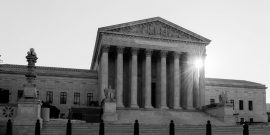In its turn to history, the Court continues to look for national, judicially enforceable answers to questions on which the Constitution offers silence.
Historians, Originalists, and Pauline Maier
One of the continuing disputes that originalists have is with historians. Very few historians are originlists, and many have no respect for the enterprise at all. It is telling that Gordon Wood, some years ago, defended originalists by saying something to the effect, their theory is mistaken, but many of them are nice people. With friends like that . . . .
Historians often criticize legal scholars, including originalists, for doing “law office history,” by which they mean the legal scholars cherry pick historial information simply to support their case. This is sometimes true, even of originalists, but all originalists recognize that this is bad practice and criticize one another for doing so. Law office originalism is bad originalism, but that does not mean there is not good originalism.
Originalists, however, also criticize historians – for what originalists call “history office law.” History office law can involve a failure to understand and be careful about legal issues. But perhaps it most often involves a mistaken understanding of the enterprise of interpretation as practiced by originalists. There are various originalist methodologies and the differences are important. But to take just one originalist methodology, the original public meaning approach asks what the meaning of a provision would have been to a reasonable and knowledgeable person at the time. Historians often do not understand or apply this correctly. And they often make statements that originalists would strongly disagree with, without any strong reasons backing them up – statements such as, because there was disagreement at the time of the Constitution on a provision, that means there was no original meaning.
My sense is that these differences are due to a variety of causes. One is that the historians often lack legal training. Another is that they appear to be trained to be skeptical of reaching conclusions that suggest a single (or dominant) view at a time or employing their own judgments about what the materials would have meant to people at the time. And a third is that people are not necessarily good at everything and if one has the skills to be a historian, he or she may not have other skills.
I was reminded of all this when I saw that Pauline Maier had passed away, just a few years after publishing her very well received book Ratification. While Maier clearly knew a lot about the past, she appeared to have had the weaknesses typical of historians. This statement from Steven Haywood at Powerline seems similar to my complaints: “She seemed to embody a trait found often among historians, of mastering and uncovering important facts, but having no systematic grasp of the wider theoretical implications of the subject matter.” That was my own limited experience with Maier, which I blogged about here.
